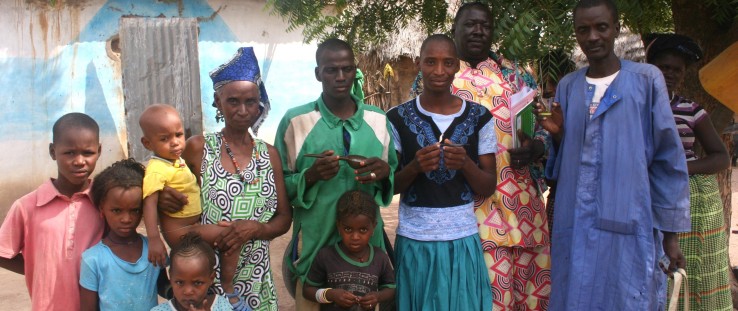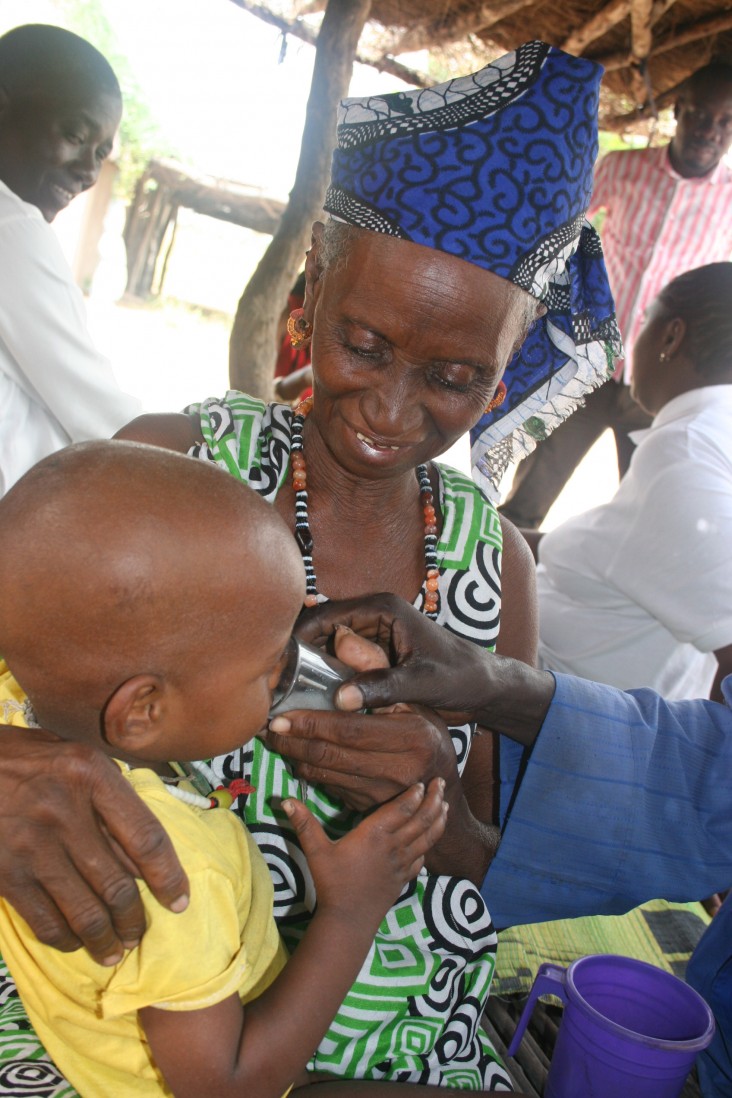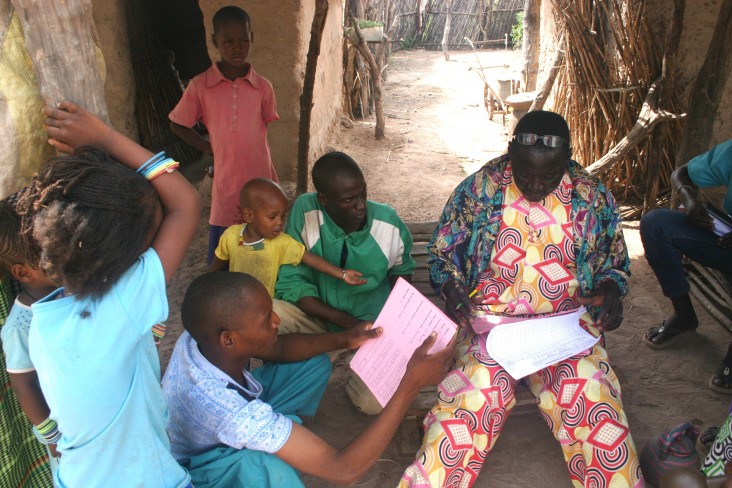 Rougui Diallo’s family poses for a photo with two community health workers, at right, after a home visit.
Joanna Sherif, USAID
Rougui Diallo’s family poses for a photo with two community health workers, at right, after a home visit.
Joanna Sherif, USAID
 Rougui Diallo’s family poses for a photo with two community health workers, at right, after a home visit.
Joanna Sherif, USAID
Rougui Diallo’s family poses for a photo with two community health workers, at right, after a home visit.
Joanna Sherif, USAID
Speeches Shim
In Koumpentoum, a rural community in southeast Senegal, Rougui Diallo is tending to her daily chores alongside five other family members and her three young children. Although it seems hard to believe under the blistering, hot sun, it rained only a few days ago and more rain is sure to come soon.
The rainy season in this part of Senegal lasts for approximately four months each year, during which more than 80 percent of malaria cases occur. Diallo is all too familiar with the timing; she and her family have all suffered from the high fevers and exhaustion brought on by the mosquito-borne infectious disease. While her children have been spared life-threatening complications, another mother in the community lost a child to malaria just a few years ago.
Malaria historically has been one of the leading causes of illness and mortality in Senegal, especially among young children. As recently as 2013, Senegal recorded more than 62,000 malaria cases in children under 5 years of age.
But all that is quickly changing because of the President’s Malaria Initiative (PMI), which has allowed Senegal’s National Malaria Control Program to rapidly introduce and expand proven prevention and treatment measures. One of the most effective of these interventions is seasonal malaria chemoprevention (SMC). Three rounds of the medications sulfadoxine-pyrimethamine and artesunate-amodiaquine given to children ages 3 months to 10 years have proven effective in protecting thousands of them from malaria in the four southeast regions with the highest transmission numbers: Tambacounda, Kolda, Kedougou and Sedhiou.
PMI operates in 19 of the highest burden countries across sub-Saharan Africa, as well as the Greater Mekong Region. In sub-Saharan Africa, use of effective malaria prevention tools such as insecticide-treated mosquito nets, indoor residual spraying and preventative treatment for pregnant women, coupled with an increase in the availability of quality and rapid malaria diagnosis and treatment, has contributed to saving an estimated 6.4 million lives across the continent.
Over the past 10 years, PMI has invested substantial resources in Senegal’s national strategy. The results? A 51 percent decrease in child mortality nationwide from 2005 to 2015. Designation of the country’s northern region as “malaria pre-elimination status,” which means that less than one case of malaria is recorded per 1,000 people at risk.
All this is leading health experts to name Senegal a major success story for malaria control in sub-Saharan Africa.
“Senegal has truly emerged as a leader in malaria control. The professionalism and commitment of Senegal’s National Malaria Control Program have been instrumental in achieving progress during the past five years,” said Rear Adm. Timothy Ziemer, senior director for global health security and biothreats on the U.S. National Security Council and former U.S. Government global malaria coordinator.
In Senegal to mark the country’s first national bed net distribution campaign to achieve universal coverage in 2016, Ziemer added: “The recent award presented to Senegal by the African Leaders Malaria Alliance (ALMA) for its progress in reducing malaria over the past five years is a testament to the strong vision and leadership this country has shown in fighting malaria. Senegal’s openness to new and innovative approaches to controlling malaria has reaped great rewards, placing it on the cutting edge of malaria control efforts and bringing it one step closer to pre-elimination status.”
2 Million … and Counting
That sweltering day in October 2016 with Diallo hard at work suddenly changed when two community health workers arrived on motorcycles. They were delivering life-saving malaria tablets for children in her community.
Last year alone, PMI procured more than 2 million tablets of malaria-prevention medicine for door-to-door distribution. The latest distribution took place in the regions of Senegal with the highest rates of malaria, including where Diallo lives.
Building community support here and in other communities was not easy, however. Dr. Kalidou Ba, head doctor of Koumpentoum district, says that when SMC was first introduced in Senegal in 2013, people were largely skeptical.
Understandably, there was initial resistance and distrust about whether medicating healthy children would actually have the reverse effect and make them sick.
A second hurdle will ring true to parents all over the world—the yuck factor. “The tablets are bitter and sometimes children find it hard to swallow,” a community health worker says after a successful round of visits. “It is not uncommon for a child to vomit right after having taken the treatment, which is discouraging for the parents, and also means the child has not received the benefits of the medicine.”
In these instances, community health workers played an integral role in communicating the important benefits of the treatment.
These days, community members almost unanimously support the SMC rainy season distribution campaigns. “People see the positive results of those who accepted the prevention treatment,” Ba explains. “They see their healthy children and they believe it [SMC] works.”
Helping the Medicine Go Down
Diallo’s neighbor Aissatou Diallo (no relation) is a character witness for the project: “My children took the medicine last year and they did not get malaria. That is why I’ll make sure they take it again this year. The health of my children is very important to me.”
Rougui Diallo is a believer now as well.
“I appreciate the time the community health workers take to explain the side effects of the medicine. They answered all my questions. I feel confident that this medicine will help my son,” she said.
The process proved easy. The community health worker administering the pills to her son told her to fetch some sugar. He mixed a teaspoon into a small glass of drinking water and crushed the SMC tablet, stirring it into the sugar-water mix. Then he handed her the glass and she held it to her toddler’s mouth. The child, who had been crying just a moment before, sat quietly on his mother’s lap and drank the entire small glass. The treatment will keep him malaria-free through the end of the rainy season, the most dangerous time of the year for young children. Diallo’s other two children also take the SMC tablet, although they are old enough to swallow it with a glass water, no sweetener required.
Senegal is only one of two countries—Mali is the other—where PMI is implementing SMC. Its success in Senegal could have wider repercussions if use expands to other PMI focus countries battling seasonal malaria transmission. “PMI is eager to expand this intervention to other eligible countries; the possibility that our work here in Senegal may save the lives of millions of children is thrilling and a huge motivating factor,” explains Pascal Zinzindohoue, PMI resident adviser at USAID/Senegal.





Comment
Make a general inquiry or suggest an improvement.